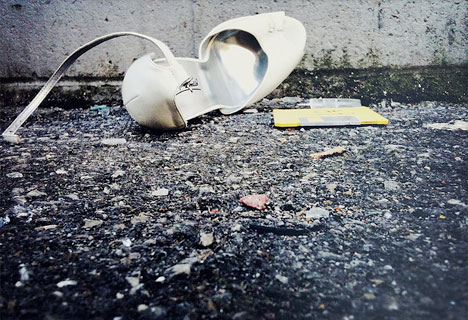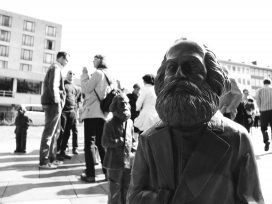How women survived post-communism (and didn't laugh)
The situation for women in societies caught up in the post-’89 transition is complicated, writes Slavenka Drakulic. On the one hand, they now stand to lose rights that were, at least formally, established during the communist regime. On the other, women’s position in society has been undermined everywhere in Europe – in East and West alike. The financial crisis has struck hard, and women have been struck harder.
In 1992, I published a book called How We Survived Communism and Even Laughed. It was one of the first accounts of women’s life under communism in eastern Europe. Now, after more than two decades, it is high time to cast another look in the same direction. This time around, the question is slightly different: how have women survived the transition from one system to another, and are they really laughing?
Europe recently celebrated the twenty-fifth anniversary of the fall of the Berlin Wall and the collapse of totalitarianism in eastern Europe. Many memories were evoked and many problems addressed – from the dreams of Europe of those long-gone times to corruption, disappointment and distrust in politics and politicians. But one topic – curiously enough – was absent, or at least barely present: how has such a dramatic change affected women? Does the new system, democracy, really work for both sexes in the same way?

Photo: Jason Parks. Source: Flickr
The answer is no, it doesn’t! There is much research to show that women in eastern Europe are hit harder than men by problems to do with social status, political representation and health. (See, for example, the OECD Gender Equality initiative.)
And yet, while there are studies on specific countries, there is no comprehensive picture of the impact of the transformation on women. This is probably because eastern European women – at last – no longer feel that they belong to a single block. And yet it is that very experience – their experience of communism – that still glues them together, because it has significantly influenced their lives after 1989.
* * *
I did survive communism and even laughed. But I’ve stopped laughing many times since. First of all, of course, because in the former Yugoslavia, the collapse of the old system brought wars. What used to be our advantage over the countries in the Soviet block, a kind of “soft totalitarianism”, turned out to be a disadvantage. It meant that there was no democratic political opposition, except nationalists, ready to take over after the collapse of communism.
Elsewhere in eastern Europe, many people stopped laughing simply because post-communism turned out to be something other than what they had dreamed. It depends on the country, of course – Poland can’t be compared to Albania – but many people in eastern Europe have found themselves in a situation of growing poverty and insecurity. While poverty was nothing new, the growing gap between rich and poor was. Our world today might look like a supermarket full of goodies, but most of us are left looking through the shop window. A character from my book A Guided Tour Through the Museum of Communism, a mole from East Berlin, describes consumerism and its new churches thus:
This is how it works, and it has not changed, from 9 November 1989, to this day: every Shopping Mall (as well as even the tiniest Supermarket) is supervised by slot machines called cash registers. These machines are positioned not at the entrances but at the very exit of the church. When a believer approaches the machine with a basket full of desired goods to quench his or her thirst for possessions, the machine scrutinizes the person in question. I imagine that the reason is to perform some sort of test of faith; it lets you pass and get out only if you are a true believer. That you have to demonstrate by either pushing a plastic card into the slot or by giving symbolic paper or metal tokens to the person, usually a female, sitting behind the cash register. Men who fail the test have to give back all the fabulous goodies they collected, and then they get very, very sad.
Before I return to my attempts back then to find out how we survived communism, let me first quote György Konrad, whose letter “To cave explorers from the West”, from 1988, will give you an idea of how we felt westerners saw us:
We are the needy relatives, we are the aborigines, we are the ones left behind – the backward, the stunted, the misshapen, the down-and-out, the moochers, parasites, con-men, suckers. Sentimental, old fashioned, childish, uninformed, troubled, melodramatic, devious, unpredictable, negligent. The ones who don’t answer letters, the ones who miss the great opportunity, the hard drinkers, the babblers, the porch-sitters, the deadline-missers, the promise-breakers, the braggarts, the immature, the monstrous, the undisciplined, the easily offended, the ones who insult each other to death but cannot break off relations. We are the maladjusted, the complainers intoxicated by failure.
We are irritating, excessive, depressing, somehow unlucky. People are accustomed to slight us. We are cheap labour; merchandise may be had from us at a lower price; people bring us their old newspapers as a gift. Letters from us come sloppily typed, unnecessarily detailed. People smile at us, pityingly, as long as we do not suddenly become unpleasant.
As long as we do not say anything strange, sharp; as long as we do not stare at our nails and bare our teeth; as long as we do not become wild and cynical.”
But my gaze from behind the “Iron Curtain” was a different one. In 1990, right after the collapse of communism, I travelled around eastern Europe for Ms., a feminist magazine from the United States. I went to Hungary, Czechoslovakia, Poland, Bulgaria and Romania – and, of course, drew on my own experience of communism in the former Yugoslavia, to describe the life of women in my part of the world.
If Konrad’s was a bird’s eye view, mine was the view from below, a frog’s view if you want. I was interested in the relationship between politics and everyday life. And above all, life experienced by women, who, down at the bottom, carried the biggest burden, taking care of children and the elderly and the whole household – all while working in full-time jobs. Each and every woman I spoke to, whether in Bulgaria or Poland, in Czechoslovakia or Hungary, could point out where communism had failed them: from shortages of food and disposable diapers to a scarcity of apartments and toilet paper. It was these banal, everyday things that defeated communism, long before 1989, and not, I am sorry to say, people’s desire for freedom, human rights and democracy.
Emancipation from above – as I call it – was the main difference between the lives of women under communism and those of women in western democracies. Emancipatory law was built into the communist legal system, guaranteeing to women all the basic rights – from voting to property ownership, from education to divorce, from equal pay for equal work to the right to control their bodies.
But, as Ulf Brunnbauer writes in his 2000 essay “From equality without democracy to democracy without equality?”: “Proclamations of gender equality never corresponded to social reality. Patriarchal values and structures were not eradicated, but the ‘family patriarch’ was replaced by the authoritarian state – emancipation was not an end in itself, but an instrument for wider political goals, as defined by the party.”
The formal equality of women in the communist world was observed mostly in public life and in institutions. The private sphere, on the other hand, was dominated by male chauvinism. This meant a lot of unreported domestic violence, for example. It also meant that men usually had no obligations at home, which left women with less time for themselves. It was not only the lack of freedom – and time – that prevented women fighting for changes but, more importantly, a lack of belief that change was necessary. Someone else up there was in charge of thinking about that for you. And because change came from the powers that be, women were made to believe there was no need for change or room for improvement.
If, however, there were any minor problems resulting from women’s specific needs, then there were women’s organizations that were supposed to take care of them. However, these were only instruments of communist party power and were concerned less with women and their needs than with ideology. Feminist consciousness didn’t exist. Since women were emancipated, there was no need for a discussion about women’s rights, so the argument went. It was as if women lived in an ideal world, but were not fully aware of it, or failed to appreciate the fact. And those who tried to enlighten them about the real situation were seen as “suspicious elements”. Women who attempted to publicly discuss feminism in Yugoslavia in the 1980s were accused by the authorities of “importing foreign, bourgeois ideas”.
The first group of Yugoslav feminists, mostly young students and academics (women academics typically got involved because they could claim to have a purely scientific interest in the subject) came together in 1978 at an international conference in Belgrade. This conference was seminal because it marked the start of the organization of women’s networks, even if these still only existed under the roof of official organizations such as the Sociological Society of Croatia, because independent organizations could not be registered.
This 1978 conference must have been a shock for our foreign guests – as it was for us. Not because of the radical ideas of Betty Friedan or Germaine Greer, we were already familiar with those. The reason we were shocked – on both sides – was the way we looked! Most of the Yugoslav participants were wearing high heels and rather heavy makeup – while the foreign feminists from Germany, France and Italy wore no make up and had on flat shoes and rather baggy dresses. It was as if they wanted to confirm the prejudices about them. I remember that there was even a workshop on high heels, such was the importance of appearances to the ideology of feminism.
We tried to tell our colleagues, among them Dacia Maraini, Alice Schwarzer, Helene Cixous, Christine Delphy and Maria Rosa Cutrufelli, that makeup was important to us because it was hard to come by. But, as we learned later, the split went much deeper than appearances. Our experience of emancipation from above and their grassroots fight collided. These different perceptions became one of the topics of my book How We Survived Communism and Even Laughed.
I also remember the conference “Sisterhood is global”, held on Rhode Island in the United States, in 1983. It was the beginning of an international feminist network and women from all continents participated. Still, there were very few of us from the communist world. That conference gave birth not only to the Sisterhood Is Global Institute but, later, also to the Network of East-West Women (NEWW), an important instrument for international assistance across geographical borders and political divides.
At that time, eastern European women speaking publicly would typically introduce themselves by saying “I am not a feminist, but…” Of course, they were afraid of being ridiculed. Today, one reads that numerous feminist NGOs were formed in eastern Europe shortly after 1989, but that was not at all my experience. During my travels for the magazine Ms., trying to find feminists was like looking for a needle in a haystack. There were good reasons for this. For a long time, even after 1989, women in former communist countries did not want to be identified as feminists, even if they were. If anything, to be a feminist was considered to be a kind of a dissident. Prejudices against western, and especially American feminists were spread by the press; not only were they men-haters too ugly to find a husband, but they were also burning bras! I personally think that this bra-burning “argument” was most effective in precisely that part of the world where it was hard to find a good bra.
***
If, as Turkish writer and journalist Ece Temelkuran recently argued, the life of women is the best indicator of a country’s political and social situation, then how much did 1989 really liberate women?
Recently, I had yet another reason to stop laughing. Abortion has again become an issue in my country, Croatia, the newest and twenty-eighth member of the European Union. Or, to be more politically correct: a pro-choice controversy has broken out there.
You might not think that abortion is important enough to cause one to stop laughing. I do. I think that the right to choose whether or not to give birth is the cornerstone of women’s emancipation, and that efforts to deny or restrict this right, in any society, point to a lot of other problems in the political, social, economic and legal position of women.
Don’t be afraid, I’m not going to bore you with a confession of my own abortion, I will leave this for one of my novels. The problem is bigger and concerns hundreds of thousands of young women, whose situation says something about other transitional countries as well.
At the end of 2014, the media reported that more and more gynaecologists in public hospitals in Croatia were refusing to perform abortions. If you are pregnant in Croatia and have decided not to have the child, things get very complicated. It is not enough that, for the majority of women, terminating a pregnancy is an agonizing decision. Nor is it enough that, unless you can pay extra, it is a painful procedure. In Croatia, you will be turned away from one hospital only to discover that, in another, doctors don’t perform the operation either. You might have to travel fifty kilometres or more to find a willing gynaecologist. All that in a country where abortion has been legal since 1969. But, since 1996, doctors, nurses and pharmacists are able to object to abortions on the grounds of conscience. In this case, a public hospital must provide another doctor for you.
In April 2015, a similar attempt was made to limit women’s freedom of choice, this time by restricting the sale of the so-called “morning-after pill”. The minister of health issued instructions to pharmacists that these pills, which according to EU rules require no prescription, can’t be sold unless the woman fills out a special form. The pharmacist is required to ask her a series of intimate questions, beginning with her last menstruation and ending with the last time she had sex. This humiliating procedure was said to be in the interests of women’s health, since the pills contain hormones. Not only does it treat women like irresponsible children incapable of making informed decisions or reading instructions, the procedure is often performed at the counter, in range of everybody present. The aim, of course, is to discourage women from using the pill.
What is astonishing about this whole bizarre situation, apart from the fact that a secular state with a socialist government is so obviously acting under the influence of the Catholic Church, is that there has been no protest or reaction by women themselves. Women’s voices have been absent in the debate. Yes, a letter signed by a few NGOs was sent to the minister of health, who then reminded the hospitals that they are obliged to provide a doctor who doesn’t object to abortion (performing abortions privately is illegal). A few women journalists also wrote about it. But the majority of women, especially young women who should be most concerned, simply did not react. There was no mass protest, as one might have expected, either on city squares or in social media. Is this not strange in a democratic, post-communist country? Why did the new generation of women, born into a democratic system, not respond to what can only be described as a clear infringement of their rights?
Croatia is a country that prides itself on having a female president. And there is good reason to be proud, considering that there aren’t many women presidents around – in fact, there are only 15 in the whole world. So a female president seems like a considerable victory for women, a defiance of the political glass celling. But, as we all know, female political leadership doesn’t necessarily mean an improvement in the situation of women.
Kolinda Grabar Kitarovic was born in 1968. She grew up in communist Yugoslavia and was therefore guaranteed equal rights (at least formally). This made her emancipation possible. Historically, like in many other feudal countries in eastern Europe, the great majority of Croatian women were illiterate. In 1869, only 150 years ago, 86 per cent of the women couldn’t read or write. Women weren’t even able to sign their names. They couldn’t inherit property, divorce or choose not to have baby. They only got the right to study 110 years ago. Our president’s grandmother, probably born some time in the mid-1920s, would never even have dreamed of a political career before the communist government gave her the right to vote in 1945. However, this was something that the president avoided mentioning in her speech at the UN conference on women in March this year. Because if she had, she would have had to admit that it was her communist education that had enabled her to reach the highest political position in the new, democratic Croatia.
From a disenfranchised grandma to a future president growing up with equal rights – this is an example of the changes brought by communism in a very short time. It is, indeed, a demonstration of what communism did for women by emancipating them from above.
But to come back to the abortion issue. These young women’s disinterest in their own situation and their ignorance of the past is frightening. I really wonder if they are aware that what is going on is the limitation of their right to choose by roundabout means. Perhaps they don’t understand that such a drastic violation of rights actually concerns them. Or, if they do understand, then perhaps they don’t react because they think that abortion is not what a woman does nowadays in Croatia. According to the latest opinion poll, however, 51.2 per cent of female students are pro-choice.
The post-communist revival of conservative values, nationalism and religion is having an effect on the behaviour of women not only in my small country. Their passivity and disinterest is not hard to understand. When everything around you is changing so dramatically, then you tend not to embrace the new circumstances, but to cling to habits, values and ideas that were there before – before communism. Unfortunately, this means a radical backlash, the return to a feudal value system. After the collapse of communism, most countries in the region experienced a renaissance of nationalism and religion – precisely the two things that were suppressed under communism. It was all that remained from the pre-communist past. Patriarchy, which seemed to have disappeared, reared its head again, looking healthier than ever. Patriarchy after Patriarchy – as Karl Kaser wrote. But is it only temporary?
So, for women in eastern Europe, the freedom regained in 1989 has brought unexpected limitations on economic, social and even reproductive rights. Women were hit by cuts in public spending and seen as an inferior category of employee, causing mass female unemployment. Poverty was feminized. With the political focus on economic transformation and the building of democratic structures, women’s rights weren’t a top priority. As a result, fewer and fewer women worked (although we now know that many, between 30 to 50 per cent, were part of the informal economy). More and more stayed at home, avoiding politics and public life, being persuaded that this was the right thing to do.
And yet, no women’s movement was born. There is no sense of mutual interests. The idea that women should support women to achieve common objectives simply doesn’t exist. The ideology of collective solidarity belongs to the past. Women in government do not recognize gender as a political issue. The biggest barrier to women’s political participation may not be legal but cultural.
***
There is another important reason, besides the return of patriarchal values, for why women who grew up after communism do not react to the obvious wrongdoings that affect them. An authoritarian mentality, inherited from the communist system, prevails across society as a whole. People expect solutions to come from someone else – a party, an institution, a leader, an authority – and not from ordinary citizens. For decades, solutions always came “from above”. Where is the democratic know-how supposed to come from? Certainly not from the totalitarian tradition.
And yet, young women today happily enjoy the benefits of that very same heritage, such as the right to divorce, to sexual freedom, to co-habit outside marriage, and now even same-sex relationships. They take these rights and freedoms for granted, without reflecting on how they came about.
Ultimately, young women in the former communist countries have also been “emancipated from above”. Like their mothers and grandmothers, they enjoy, at least formally, the rights that women in the western democracies had to fight hard for. But on the other hand, it is exactly this kind of emancipation that makes them so passive.
***
It should be clear by now that the situation for women in societies caught up in the post-’89 transition is complicated. On the one hand, they now stand to lose rights that were, at least formally, established during the communist regime. On the other hand, women’s position in society has been undermined everywhere in Europe – in East and West alike. The financial crisis has struck hard, and – as so often – women have been struck harder.
What has happened in western Europe in the last 25 years is certainly not encouraging. In the West, women fought for their rights over decades of grass-root activism, struggle and mass-protests. Sure, hard-won privileges are more persistent than those bestowed upon you. But women in the West also suffer from under-employment, pay inequality, the glass ceiling, loss of status. In the West, too, women engage less in politics. All that has got worse over the past decade. The financial crisis is indeed a common denominator. It has hit all of Europe and everyone in it, East and West, men and women.
So, why focus on women when, as the argument goes, men have also got a bad deal? True, loss of work and social status pose real problems to men and their masculine identity. But while men have problems, women are facing crisis. Youth unemployment is highest among women; the majority of people that are laid off, the majority on social benefits, the majority of those on sick leave, the majority of the poor – all are women.
From job segregation to the feminization of poverty and the paradox that fewer women are in work despite more women having qualifications – the statistical data for Europe (East and West) are clear. The latest report (2014) on gender equality by the EU Commission states that the overall employment rate for women in Europe is around 63 per cent, compared to around 75 per cent for men aged 20 to 64. On average, women in the EU earn 16 per cent less per hour than men. The gender pay gap varies across Europe. It is below 10 per cent in Slovenia, Malta, Poland, Italy, Luxembourg and Romania, but wider than 20 per cent in Hungary, Slovakia, the Czech Republic, Germany, Austria and Estonia. Although the overall gender pay gap has narrowed in the last decade, in some countries it has grown, for example in Hungary and Portugal.
The gender pay gap exists even though women do better at school and university than men. On average, in 2012, 83 per cent of young women reach at least upper secondary school in the EU, compared to 77.6 per cent of men. Women also make up 60 per cent of university graduates in the EU.
The impact of the gender pay gap is long-term, since it means that women earn less over their lifetimes, which results in lower pensions and a risk of poverty in old age. In 2012, 21.7 per cent of women aged 65 and over were at risk of poverty, compared to 16.3 per cent of men.
For women, the most worrying consequence of the financial crisis is the dismantling of the welfare state. This also affects women more than men, for example when governments terminate or significantly reduce social benefits intended to bring women into employment.
And here we come back to the issue of – abortion! We live in an economic system dominated by the principle of the maximization of profit and minimization of cost. This is one reason why women experience financial and economic crisis differently to men. Women are a more expensive work force! They are the last to get employed and the first to lose a job. The main reason is that they have the capacity to give birth. Once mothers, they are dependent on help from society in the form of special benefits, such as maternity leave. They will be more likely to use sick leave in order to attend their sick children. In a welfare state, they are also entitled to other benefits, costly both to the state and private employers. Therefore, if a private employer is able to choose between two equal candidates, a man and a woman, he is very likely to choose the man. In other words, he will not exercise equal opportunity if he is not forced to. Or the woman will be obliged, through a secret contract, to abstain from having children in the next five to ten years, especially if she is hired for a high position. The result is that more women work in insecure jobs with temporary contracts. Many decide not to have children at all.
In societies dominated by capitalism, having children is increasingly treated as an individual responsibility. At the same time, it is not only nationalists that warn that Europe is dying out and that we need more children. Religious leaders are saying the same thing. Political leaders – not only conservatives – in impoverished former communist countries tell women that they are responsible for the “death of the nation”. So, which is it? Is a woman’s decision whether or not to have a child a private matter, or is it a question of her duty to society?
Romania under Ceausescu was an example of a communist society that treated women as birthing machines. Abortion was forbidden and menstruation closely monitored through obligatory examinations. In many post-communist societies today, a woman’s body still does not belong entirely to her, since it represents a means for the reproduction of society. Yet the more the state wants to control reproduction, the less it wants to pay for it. As a result, women’s basic right to choose can be revoked at any time. One of the first acts of the first democratically elected Polish government was to abolish the entitlement to free abortion. In other words, to control women’s bodies.
Ever since the introduction of mass contraception, biology has ceased to be destiny. However, women should not forget that socio-economic downturn can cause a backlash and return women to the past. This is why abortion is a basic right, that, having been won, must be guarded vigilantly. Because yes, we can easily step back into the past. Decades after the fall of communism, women must watch out for their rights more than ever.
In fact, it seems to me that it is even more important than before for women to understand that their rights are equal to their political interests. Women can’t fight for their rights without realizing that there is a fight to be fought, without an awareness formed by information and knowledge, without an articulation of the precarious status of women and their different needs. Are women aware of that? And are they willing and capable of mobilization?
Eighty-two year old Gloria Steinem, a representative of what is now called “vintage feminism”, once wrote that women get more radical the older they get. Certainly, the experience of inequality motivates one to voice one’s opinions and demands. But to wait for today’s generation to grow old doesn’t seem to me to be a viable option; it would mean to start from scratch all over again.
So, what if women don’t even recognize the dangers they face and consequently feel no need to fight for equality? What if values have changed so much that women increasingly see their subordinate position as normal?
Indeed, one of the dangers facing new generations of women is the post-feminist credo that the struggle for equal rights has been won. In an episode of the popular US TV show The Good Wife, a young trainee in a lawyer’s office is getting married and will be leaving the office. But why, asks an older female colleague? You are good, you should work, she says. Maybe it was important for your generation to work, but my generation doesn’t have to prove itself, says the bride to be.
Well, she is wrong. Women’s struggle for equal rights was not only about proving oneself, it was about making sure that other women don’t have to face the same discrimination.
A hundred years after the first International Women’s Day on 8 March, research by a British clinic for helping female rape victims found that a quarter of young women between 18 and 24 believed that they had been responsible for being raped. There has been a considerable increase in domestic and sexual violence: sex slavery, rape, trafficking – it has all gone up. Do we want to break through the glass celling? Yes of course. But at the same time, we need to defend our achievements and regain what, in some countries, has already been lost.
Back in 2004, the Parliamentary Assembly of the EU issued a series of recommendations to the governments of Central and Eastern Europe, including that they take measures against unemployment, the gender pay gap, discrimination, the reduction of childcare facilities, violence against women, and women’s under-representation in politics. Countries were also encouraged to raise awareness of the legal rights of women. The paper concluded by underlining the necessity that gender equality be integrated into everyday life in countries undergoing post-communist transition. All very sensible, all very useful, and accepted with acclamation. But not much has changed…
***
What remains as a strategy? We should remind ourselves that, in a democracy, citizens – that includes women – have the power to change laws. Gender democracy is an essential part of democracy: no participation from women – no real democracy. That is the situation we are in today, not only in eastern Europe. We need an emancipation after emancipation.
Let me not end on this pessimistic note – after all, we are talking about the glass celling while only 500 years ago the Catholic Church was still discussing whether the woman was indeed a human being, whether she had a soul. Well, there has been some progress, I suppose!
Published 5 June 2015
Original in English
First published by Transit Online, 2 June 2015 (English original)
Contributed by Transit © Slavenka Drakulic / IWM / Eurozine
PDF/PRINTPublished in
In collaboration with
Newsletter
Subscribe to know what’s worth thinking about.
Related Articles

Of hamsters and vultures
Even entire countries can be sold off at rock-bottom prices
The global debate on how to handle sovereign debt shows that predatory behaviour has become an issue for countries around the world. And in the acute situation in Argentina, writes Martin Schürz, there should be no illusions as to where economic power actually lies.






